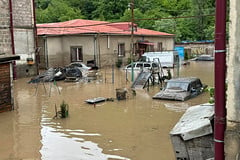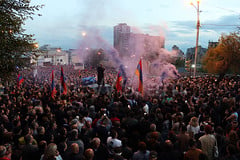
The embassy of Armenia in Switzerland, which is also Armenia’s permanent mission at the UN office at Geneva, published the report of the UN Special Rapporteur on Cultural Rights on the state of cultural and religious significant places in Nagorno-Karabakh.
The embassy of Armenia in Switzerland, which is also Armenia’s permanent mission at the UN office at Geneva, published the report of the UN Special Rapporteur on Cultural Rights on the state of cultural and religious significant places in Nagorno-Karabakh, informed First Channel News of Armenia.
In the communication addressed to Azerbaijan, the UN Special Rapporteur on cultural rights expressed concern on “ongoing pattern of destruction and appropriation of Armenian historically, culturally and religiously significant sites and objects, of organised reinterpretation of history of Nagorno-Karabakh to erase traces of the presence of Armenians and of discriminatory narrative against and harassment of Armenians in the region, in violation of international human rights standards and of international humanitarian law.”
“I am particularly concerned about the allegations that the combined attacks to people, monuments and symbols, the falsification of the historical narrative and erasure of place names and the negative discourses about Armenians may amount to cultural cleansing.”
The UN Special Rapporteur underlined that “the International Court of Justice, the European Parliament and the Council of Europe have all expressed concerns about a developing narrative in Azerbaijan promoting a ‘Caucasian Albanian’ heritage to replace ‘Armenian’ cultural heritage and the revisionist tendency negating Armenian cultural heritage and presence. The vast majority of experts in the region’s art, architecture, and archaeology have all rejected the revisionist claims as false.”
She emphasized that “since 12 December 2022, the Lachin corridor connecting Nagorno-Karabakh, to Armenia has been blocked, in violation of the obligations assumed by Azerbaijan through trilateral ceasefire statement of 9 November 2020 (point 6). As a direct result of the road blocking, reportedly 120.000 people have been isolated and deprived of various goods and services, which has created a humanitarian crisis and has had devastating consequences on multiple human rights.
“The crisis would therefore be direct manifestation of discriminatory approach of Azerbaijan towards Armenians. Once region is cleansed of ethnic Armenians, it is alleged that Azerbaijan has planned to further remove all physical indications of presence of Armenians” concluded the UN Special Rapporteur.






















